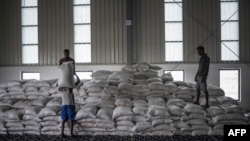Ethiopia is refuting reports of a fuel shortage in the embattled Tigray region.
A European Union official visited Tigray this week, and on Tuesday said a lack of fuel is preventing delivery of much-needed humanitarian aid. However, a spokeswoman for Ethiopia's prime minister told VOA that the idea of a fuel shortage in Tigray is a myth.
European Union Commissioner for Crisis Management Janez Lenarcic said Tigrayans have suffered enough due to a continuous aid blockade.
He said at a news conference in Addis Ababa on Tuesday that the number of trucks bringing food to the regional capital, Mekelle, has almost reached the level necessary to cover the basic humanitarian needs of the people of Tigray.
However, he said the aid effort needs more fuel so that humanitarian workers can deliver assistance to all in need.
"There's need to lift restrictions, especially on the provision of fuel. More fuel is needed because without it, even this food assistance that comes to Mekelle cannot reach rural areas where the needs are highest," Lenarcic said. "So now we have a situation, where humanitarian houses in Mekelle are full, but the people out there in the countryside are still hungry."
The conflict that began in November 2020 between the Ethiopian federal government and the rebel Tigray People's Liberation Front has forced thousands to the brink of famine and left millions more in need of food aid.
Lenarcic also urged Prime Minister Ahmed Abiy's government to lift financial restrictions he said are hampering the provision of basic services, such as payment of salaries to humanitarian workers and hospital employees who have gone without pay for one year.
"I fail to see the military rationale being the blockade of electricity, banking services," Lenarcic said. "On the contrary, we believe that these services should be restored without delay, because they are primarily destined to the civilian use, and the lack of these services aggravates the humanitarian situation in that region."
However, the Ethiopia federal government denies any blockades, especially on fuel.
A spokeswoman for Abiy, Billene Seyoum, said data available indicates that last week alone, three fuel tankers carrying over 137,500 liters of fuel arrived in Mekelle.
Seyoum said that, in total, more than 920,000 liters of fuel have been sent to the region since April.
"So, the myth of fuel shortage is a TPLF hidden agenda to enhance mobility of its army in preparation for another round of conflict. Hence, there are no fuel sanctions and such claims need to be reviewed with clarity on the reality," Seyoum said.
On its Twitter account, the Tigray External Affairs Office insists the level of aid being allowed into Tigray does not meet the region's needs. It says between April and early June, just over 770,000 liters of fuel have been allowed into Tigray.
In a text message to VOA, TPLF spokesperson Getachaw Reda accused the Abiy government of misrepresenting facts. He said the fuel shortage in Tigray is as vicious as creating unnecessary checkpoints or other obstacles aimed at hindering humanitarian access.




